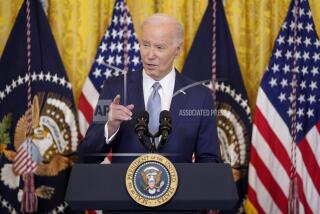Judge in Texas Plans to Ban Self-Help Legal Software
- Share via
DALLAS — In the first such ruling in the nation, a federal judge says he will ban the sale of some self-help legal software, contending it amounts to the unauthorized practice of law.
The Texas court battle has national implications for law practice and software authorship, and the issue could wind up before state legislatures and the U.S. Supreme Court, lawyers said Tuesday.
While Texas has become the first state in the nation to move toward outlawing such “cyberlawyer” software, others have considered action against publishers of self-help legal manuals that provide assistance with wills, prenuptial agreements and other documents.
The opinion that is sparking the debate came from U.S. District Judge Barefoot Sanders, who said he plans to bar Parsons Technology Inc. from distributing future copies of Intuit Inc.’s Quicken Family Lawyer and Quicken Family Lawyer ’99 in Texas.
Sanders determined late last month that Quicken’s law program goes beyond merely distributing blank legal forms and “falls within the range of conduct that Texas courts have determined to be the unauthorized practice of law.”
He rejected the Hiawatha, Iowa, company’s arguments of free expression.
“Texas is the only state that has taken a position that a book or a software program can constitute the practice of law,” said Parsons attorney Darrell E. Jordan. He said the company will seek a rehearing once Sanders’ opinion is final and appeal to the U.S. 5th Circuit Court of Appeals, if necessary.
Bruce Dorner, a lawyer in Londonderry, N.H., and a member of the American Bar Assn.’s Governing Council of the Law Practice Management Section, said Texas is apparently the first state to aggressively pursue action against do-it-yourself law materials.
“They then found it necessary to go to federal court and a judge has agreed with them. That seems to sound like they are on reasonably solid ground,” Dorner said.






